23 Alternate Search Engines You Should Pay Attention To — Not Including Google
Get a free consultationAll good great things come in 23. Michael Jordan, and our list of alternative search engines besides Google!
We all know that Google dominates the internet. It’s even penetrated our everyday language — when we search for something online, we don’t search for it. We google it.
But, as the old saying goes, you shouldn’t put all your eggs in one basket.
Internet users have grown weary of all the information Google tracks to share with advertisers. To protect their data, some now opt for a more discreet search engine experience.
We’re not saying discount Google SEO altogether, but you should definitely optimize your website for alternative search engines too. You have a serious opportunity to increase traffic from a whole new market — the market of those not using Google.
To help, we’ve gathered a list of alternative search engines to Google, from the big competitors to the ones you’ve never even heard of.
Keep reading to find out what’s out there.
The Best Alternative Search Engines
Google holds the number one spot, and that won’t change any time soon. But don’t forget to cover all your bases. Check out the 23 alternative search engines we think are well worth your time.
The Big League:
Charitable Sites:
Data & Statistics:
Niche Format Sites:
Privacy-Considerate Sites:
The Big League Alternative Search Engines
The following alternatives are similar to Google.
However, it’s still good to know about their potential boons and banes, so you can focus on where to put your SEO energy.
Bing

This Microsoft platform is the second largest in the United States and has almost a 7% global market share.
Its features are similar to Google, including content like currency conversion, translation, image, and video searches.
Unfortunately, it’s also similar to Google’s privacy policy. Microsoft gathers data from all product interactions. Plus, the search quality is on par with Google’s.
In 2019, Bing faced severe backlash regarding their safe search. It has since been cleared up.
Jagadeash, a content marketer from picmaker.com, told us, “All we have to look at is the Google Analytics profile of our website. When you break it down by search engine, Bing is our 2nd biggest source of traffic, and that traffic spans across many of our landing pages and blog posts.”
Yahoo

Yahoo has definitely shrunk in size in recent years, but it’s still the third-largest U.S. search engine.
Bing powers the Yahoo platform, but there are few differences in results. Yahoo also doesn’t clearly distinguish between the paid and organic results. Plus, the UI is far less engaging than Bing’s.
Like Bing and Google, it does collect personal information during account registration and while interacting with their services. Additionally, it may share your data with Verizon, Yahoo’s parent company.
Where Yahoo shines for users is in its News, Sport, and Finance sections. This is often the go-to platform for inquiries related to those subjects.
The CEO of coachfoundation.com, Sai Blackbyrn, reiterated that to us, “Yahoo is often the go-to platform for politics, finance, and sports news. If your website offers news, sports, and finance content, then it is crucial that you prioritize ranking highly on Yahoo in addition to Google.”
Baidu
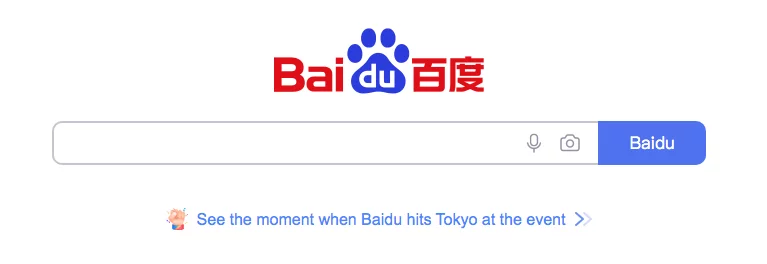
Baidu is a Chinese company specifically focused on the local Chinese market (whereas Google is global). We still find it worth mentioning because, hey, maybe that’s your target audience.
Baidu accounts for just over 72% of China’s searches. It has product features similar to Google, despite its false reputation as an “online search specific” engine.
The website does require a strong knowledge of local Chinese culture and language, however. Baidu’s algorithms are adapted to the complex Chinese language, where certain words have varied meanings. The algorithm considers a word’s context to keep user inquiries relevant. Google has been unable to do this, which is why Baidu is favored among Chinese users.
Again, this engine is only something to consider if your target audience is within China. You’ll also have to remain compliant with censorship and local laws.
Charitable Alternative Search Engines
Love giving back? Then you’ll love these engines with a cause. Each company donates funds for every search you perform.
These three are definitely worth your consideration:
Ecosia
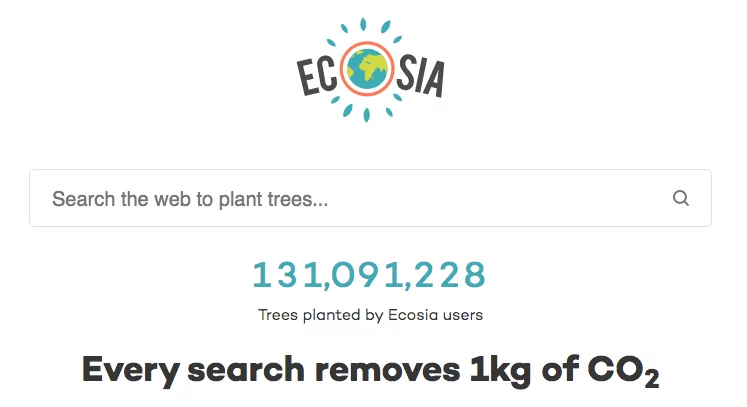
Ecosia’s mission revolves around bettering the environment, using its revenue to plant trees globally.
In May 2021, it had 0.06% of the market share, making it the 6th largest in the U.S.
Bing powers the results themselves, so users will still get a great experience. But Ecosia also puts a stronger emphasis on user privacy, offering the option to disable tracking.
There are 15 million active users who’ve all helped plant over 100 million trees around the world.
Thanks to its charitable mission and the increased data protection, it’s rising in popularity and is certainly a major player in our best alternative search engines list.
We chatted with Dylan Morgan of Twinkl and he also touched on some of the points that makes Ecosia a decent search engine. He said, “Ecosia is what I’d suggest. Their commitment to issues such as climate change and emissions is tackled by their pledge to plant a tree for every search conducted on their website. As well as improving CSR and brand image from a business perspective, it is completely free of charge to implement and use.” They’re even carbon neutral!
Some websites or institutions that also pledge for environmental cleanliness, like the University of Sheffield in the UK, are seeing a spike in traffic from Ecosia. They saw over 14,000 website visits from the search engine.
There is no doubt Ecosia will rise in popularity in years to come.
giveWater
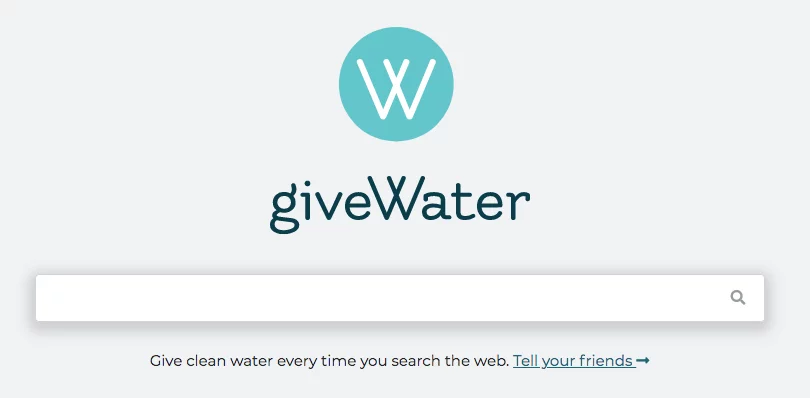
Using giveWater as an engine helps provide clean water and sanitation around the world.
Users generate donations when they click on the paid ads. giveWater has yet to publish its contributions but claims it plans to in the near future.
Bing also powers the engine, meaning results are reliable for users.
As far as privacy goes, it collects data when users interact with its products and services. However, you can elect to turn off certain cookies while on giveWater.
Ekoru

Ekoru helps clean up our oceans. Specifically, a certain amount of revenue from every inquiry is allocated to Big Blue Ocean Cleanup and Operation Posidonia.
To further its contribution to a cleaner world, Ekoru’s servers draw power from hydroelectricity.
On top of its charity work, Ekoru is invested in user privacy. The site encrypts all data and doesn’t store user data.
If you want an eco-friendly, privacy-first engine, then Ekoru is an exceptional alternative.
Social Media Search Engines
There’s an odd dance between privacy-invested users and users with an active social media life. You’ll have to optimize on both fronts.
Below, we discuss Facebook and Twitter to help you gain insight on how those websites can be considered some of the best alternative search engines to Google.

Twitter is home to an intricate Advanced Search function, which allows users to discover better results.
People can search based on an exact phrase or individual words and hashtags, but they can also exclude words from their search. They can filter out original tweets and just read replies — users can even hide Tweets containing links.
You’ll especially want to take advantage of it if you’re building a local audience, as Twitter’s Advanced Search includes a “near here” field.

What began as a website to catch up with old friends has become a full-fledged search engine. Certain advanced options let users search across various fields, like location, events, and even Bing web results.
With the help of Facebook Graph Search, it used to do a lot more search-wise. But after a few security lapses, Facebook turned off key functions of Facebook Graph in 2019.
If interested in researching Facebook optimization, you can use Facebook operators to perform a more thorough search.
YouTube

YouTube is actually the world’s second-largest search engine behind Google. The social media video platform has become increasingly powerful. Why? Well, because people want to be entertained and learn things like news and “how to’s” from videos.
If businesses aren’t optimizing their YouTube or video content, they are likely missing out. Plus, YouTube videos even sometimes show in Google searches.
Enhancing YouTube videos and channels the same way you would a meta title or description on a website landing page is important. If we were to rank these 23 search engines aside from Google, YouTube would be #2 on the list!
Data & Statistic Searches
Want to compare statistics and data from your brand inspirations? Maybe get logistical information about a competitor to help push your business in the right direction?
Then try the data-centric alternative search engines. Just know their services may also come with a fee, depending on your business needs.
SimilarWeb
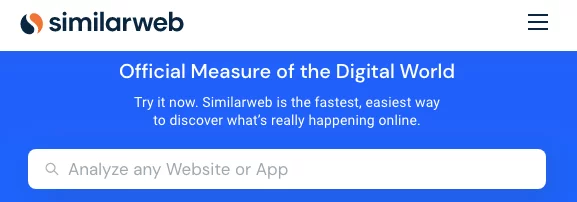
SimilarWeb lets users look for app profiles and websites based on the app or domain names.
You can gather data like online vs. mobile page views, demographics, total monthly region visitors, similar sites audiences visit, and more.
It’s important to note that extensive data will only come from domains touting a high volume of traffic.
All-in-all, SimilarWeb will help you see what your competitors are doing right. And, with some introspection, it can give you insight on adjusting your own online presence accordingly.
CrunchBase

CrunchBase goes a bit beyond presenting numbers. For example, you can use its functions to gain insight on whom a brand or company is associated with, relevant videos, pictures, screenshots, and even contact information.
For market research, you gain the ability to track industry trends. But, as mentioned earlier, CrunchBase will cost you — the lowest tier is $29.99 per month.
Alternative Search Engines For Specific Formats
Think about everything searchable on Google. There are specific features for performing niche format searches — like Google Images or Google Scholar.
But is Google the best for such specific inquiries? Not necessarily.
Here is a handful of format-specific search engines:
GIPHY

You may not know its correct pronunciation, but you do know they’re everywhere. We’re talking about gifs.
The GIPHY library hosts over 10 billion gifs from television shows, Snapchat videos, TikToks, etc. You’ve definitely encountered a GIPHY gif, and maybe you’ve even used one.
You can boost your website by peppering it with relevant gifs, giving you a relevant edge over the competition. However, do this tactfully as nothing is worse than stumbling across a page with a thousand elements in motion.
You can also create your own gifs of your products, services, or marketing videos and upload them to GIPHY to appear on their searches.
Wiki.com
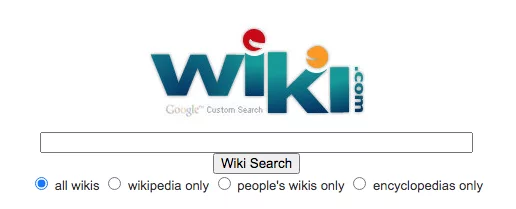
Wiki.com searches the widely-used Wikipedia, other encyclopedias, and community wikis.
Users may not directly find your website via the search engine, but what’s stopping you from making a Wiki for your page? You could potentially tap into a community-led market by optimizing for Wiki.com.

Users will need to have an account to search the platform, but that hasn’t stopped Pinterest’s popularity.
You can search visuals, but those images link to various online blogs. You can certainly use this to your advantage.
For example, if you run a food-related website, you can upload a photo of a recipe you’ve made and have the photo direct people to your blog containing the full recipe.
And, unlike Google, users are specifically using this website to save things to their profile to revisit or share.
Slideshare

This engine doubles as a learning platform and hosts slide decks covering various topics. There are presentations about Dropbox, creating a work-life balance, and even photography lessons.
Slideshare has many categories to explore, and you’ll certainly find your niche among them.
By hosting a presentation on Slideshare, you’re reinforcing your reputation as a reliable source by sharing niche knowledge. And as you know, customers love a reliable brand.
Especially consider Slideshare if your business is services-based. It allows you to engage with your target audience in a unique, memorable way.
Unsplash

Unsplash is still a way for you to help the content and image requirements of your own website.
Imagery is an essential aspect of engagement, but stock photos can be super expensive. Unsplash provides royalty-free visuals for marketing materials, social media, or even when making your logo.
Even if it doesn’t seem relevant to optimize for this search engine, this alternative will help you in other ways, which is why it’s worth us mentioning.
Best Alternative Search Engines for Extra Privacy
As data breaches and other internet-based privacy scandals occur, it’s easy to see why privacy-first search engines are on the rise.
The following are privacy-focused alternative search engines to Google. And you’ll want to put serious energy into optimizing for them.
Startpage
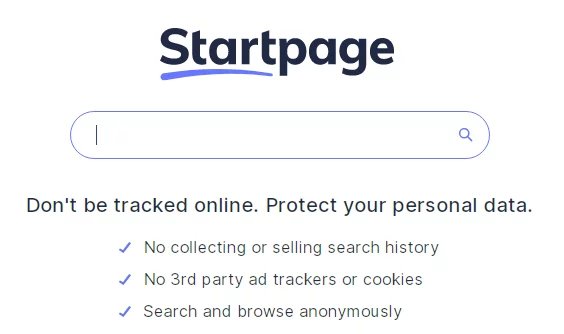
Startpage claims it’s the most private search engine in the world. A strict ‘no-logs policy backs their word.
In short, ‘no-logs means the platform doesn’t have the slightest idea who its users are. They don’t store tracking cookies or other user information, like your IP address. Of course, this also means they can’t sell any of your data, either, meaning you don’t have to worry about sketchy companies accessing your information.
If you have difficulty finding this true, the proof is in Startpage’s European Privacy Seal audit.
This search engine offers a Google Chrome plugin for user convenience. The results are even powered by Google, which makes optimization easy.
Search Encrypt

Search Encrypt is another Google-like, privacy-first search engine.
On its About page, Search Encrypt lays its purpose out plainly. It’s an extension that detects searches possibly tracked and tied to personal information and then re-directs them to Search Encrypt’s privacy-first engine.
One thing to note is browsing history remains for 30 minutes but clears completely after that.
Swisscows
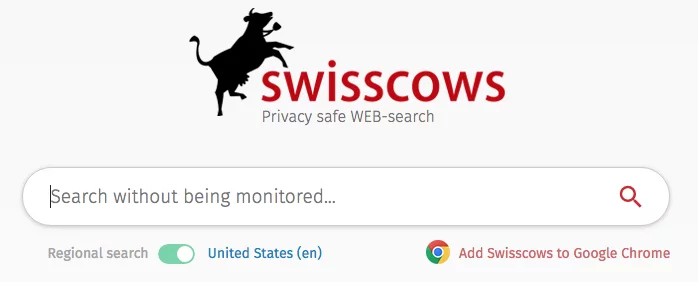
This search engine is based in Switzerland, hence the name Swisscows.
It has its own indexing for German searches, but Bing powers all the others. Swisscows ensures privacy by routing searches via a firewall, stripping away private information.
It places a strong emphasis on the following three core values:
- Swisscow doesn’t store your data
- It promotes “family-friendly” content only
- It has designed an innovative search engine
The family-friendly aspect filters out pornographic and violent content, and there’s no way to remove those filters.
Tony Panaccio of Lightspeed PR told us, “Swisscows is a search engine based in Switzerland, a country whose rule of law believes that Internet user data belongs NOT to the platform, but the user. As such, Swisscows is more than just an entry in the “non-trackable search engine” sweepstakes, but rather, it’s a search engine literally prohibited by law from monetizing user data the way we do in the U.S.”
Recently, the engine has taken its dedication to safety a step further. Swisscows ads help fund food security programs for children in Haiti and Colombia.
OneSearch
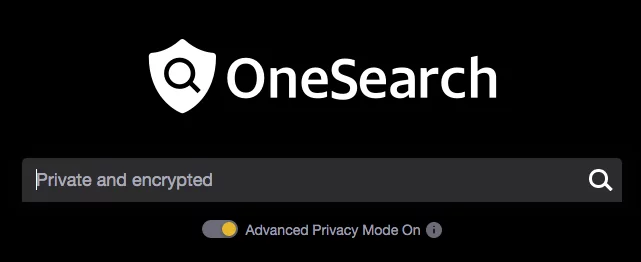
After dealing with the infamous data breaches of Yahoo, Verizon wised up and created its own search engine.
And this one offers a lot more security.
OneSearch is a privacy-emphasized search engine with six core features, which are:
- Keyword encryption
- Pure, unfiltered results
- No cookies
- No search history
- No user tracking
- Share links with confidence
Additionally, OneSearch results are powered by Bing. If you’re already familiar with Bing optimization, you’ll find OneSearch optimization easy.
DuckDuckGo
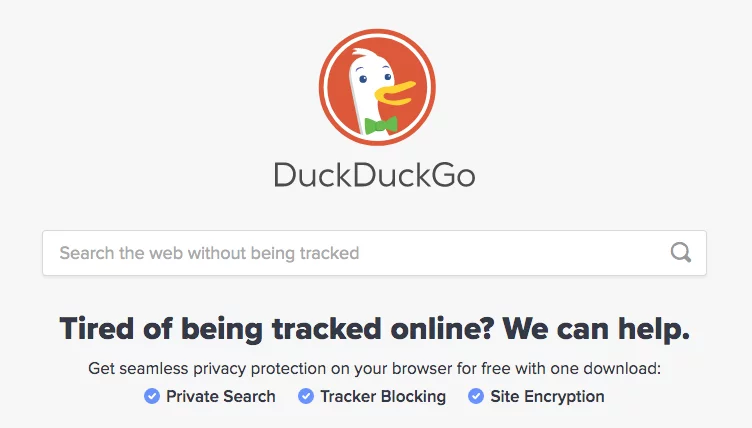
DuckDuckGo has been around since 2008 and has always taken an “anti-Google” stance. Its results come from over 400 places, including the DuckDuckBot and Wikipedia. And, of course, they partner with Bing and Google for more traditional results.
Optimization for DuckDuckGo can be relatively involved, as you’ll want to submit your site to several other search engines and have repurposed content on additional publishing platforms.
In terms of privacy, it doesn’t store personal identity information (i.e., IP addresses), and it doesn’t track cookies. While it saves sources, DuckDuckGo claims to do so in a way that won’t create a link to the user.
Privacy-oriented users have pointed out DuckDuckGo is U.S.-based, making it part of the Five Eyes intelligence alliance. Some people are wary, considering this move allows the U.S. to collect data from Internet companies when conducting mass surveillance.
The co-founder of CocoFax, Olivia Tan, touched on what makes DuckDuckGo a go-to search engine for some including their pledge to privacy. She told us, “DuckDuckGo is the first choice for search engines among the users who want to remain anonymous on the internet. While privacy is a concern on the internet, DuckDuckGo doesn’t collect your browsing history, social media profiles, emails to give you personalized search results, unlike Google. Many find DuckDuckGo user-friendly for its features like ‘zero-click’ information, infinite scroll, and prompts to clarify your questions.”
Qwant
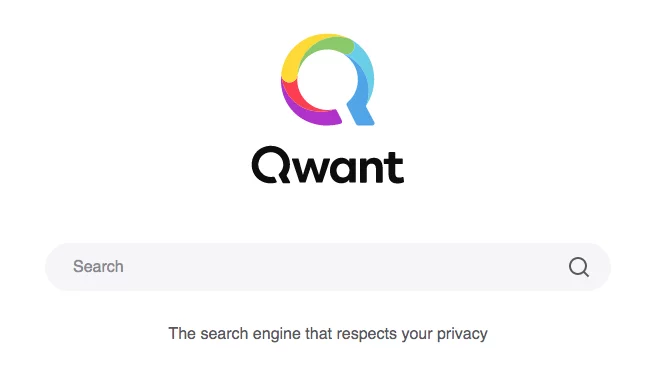
Qwant is a French-based company, which is great considering European’s privacy laws are much stricter than the U.S.
It’s highly respectful of your privacy, and the indexing engine is especially unique compared to other alternative search engines. Qwant combines with Bing results to avoid search personalization, preventing users from getting trapped in a filter bubble (AKA an echo chamber).
It does not store user information, queries, or devices and certainly doesn’t hound you with cookies.
Qwant also has its own map platform, which doesn’t track user devices when sourcing directions.
Oscobo

Oscobo is another search engine keen on protecting user privacy while searching. It doesn’t host any third-party scripts or tools on its website, protecting your data from misuse.
On its About page, Oscobo made its stance against the collection of user data evident.
All traffic is fully encrypted, including IP addresses and cookies, so you get anonymous results with no tracking involved. Oscobo won’t share search history, and it won’t show the website you go to what search term you used.
This search engine offers great usability and a user-friendly interface. It features a web search, videos, images, and even maps.
Oscobo also has a Google Chrome extension, letting you browse easily (and privately) from the Chrome bar.
FAQs for Alternative Search Engines
Which search engines don’t censor results?
DuckDuckGo, Qwant, and Startpage are all privacy-centric and don’t censor content. Users turn to these platforms when they want to see unfiltered results.
What search engine partners with the best charity?
Ecosia, giveWater, and Ekoru all work with reputable charities.
If you want a privacy-centric, charitable search engine, we recommend Ecosia or Swisscows.
What’s the best privacy-first search engine?
In terms of total users using the platform, the DuckDuckGo would be considered the best. However, Qwant and Oscobo have stronger privacy features.
Are there child-friendly search engines?
Swisscows considers itself family-friendly, as it censors out violent and pornographic material. Users are unable to change this filter, making it a popular option among families with children.
Additionally, Qwant offers family-friendly searches, but you can turn the feature off.
What’s the quickest way to optimize my site for alternative search engines?
The quickest way would be to understand both the Bing and Google algorithms. Aside from DuckDuckGo, most of the above engines are powered by either Google or Bing.
But if you’re serious about optimization, we recommend taking the time to understand the alternatives fully. If you don’t have the time, outsourcing to a professional SEO expert is in your best interest.
Optimizing Your Brand for the Alternatives
We know you’re eager to rank on the best alternative search engines, but you’ll need to take the time to understand them first.
And you’ll need to know how they differ from Google.
The Twitter and Facebook search engines require an innate understanding of social media trends, which can differ from trending Google searches in your area. And format-specific searches have an algorithm you’ll need to know to ensure you’re on there.
The good news is Bing and Google still power lots of the alternatives listed, so if you understand both of their search algorithms, you’re already one step closer to a well-optimized website.
Optimizing your website can take up a lot of time and effort. But it’s all certainly worth the investment. You’ll be able to present yourself to the appropriate target audience, giving you the gift of relevant traffic.
Even if you’re not an expert, some professionals have dedicated themselves to helping your online presence go. At LSEO, we’re proud to have a team full of said professionals.
If you’re struggling to optimize for other search engines outside of Google, reach out to us today.
